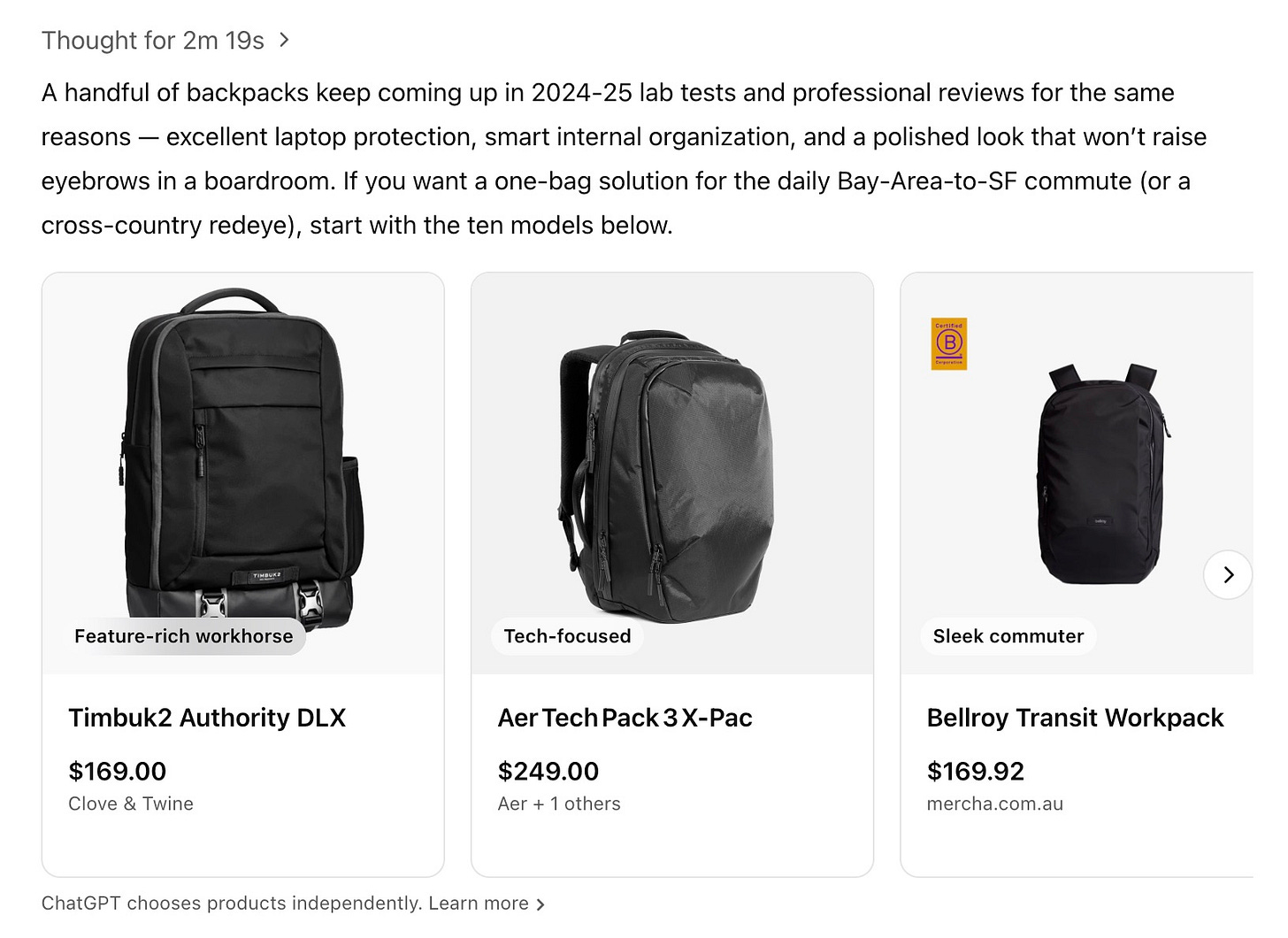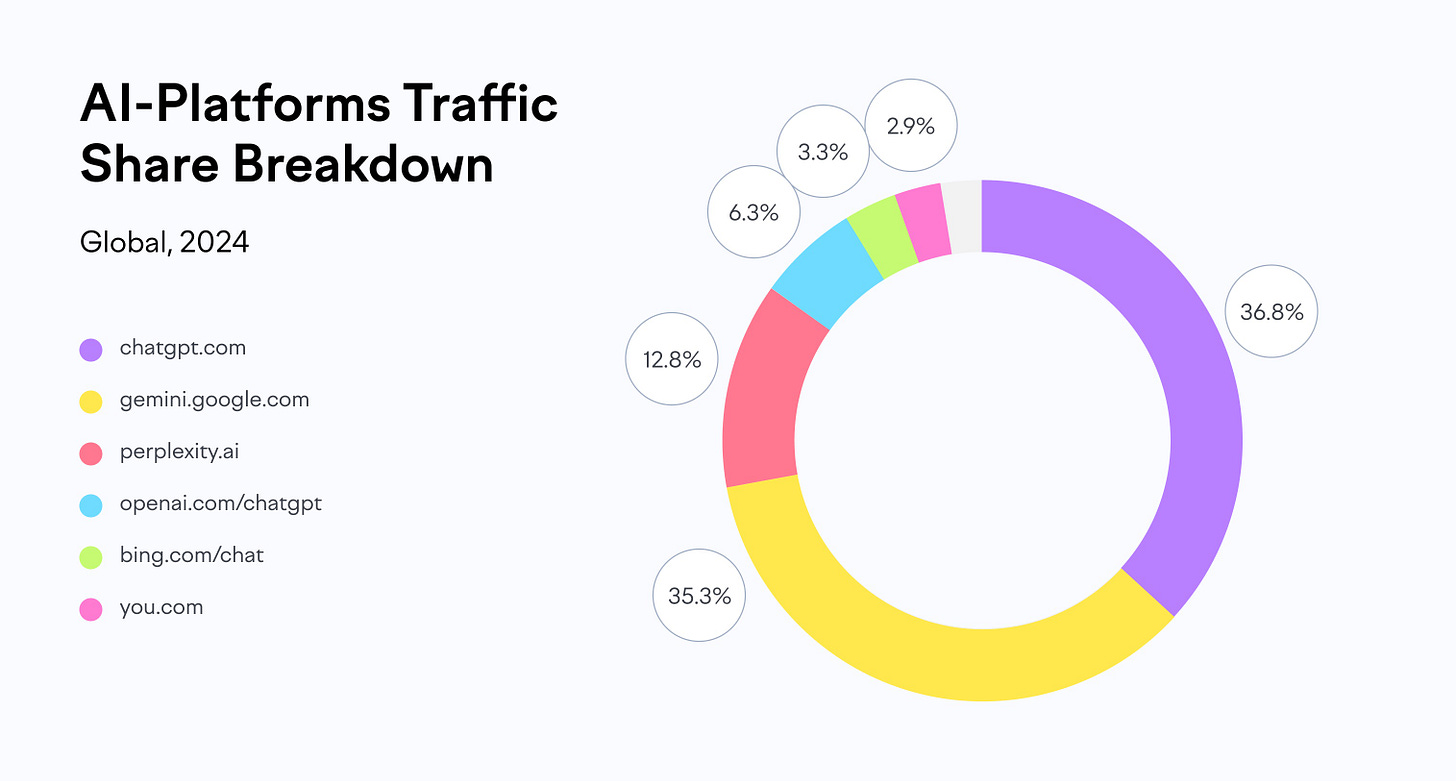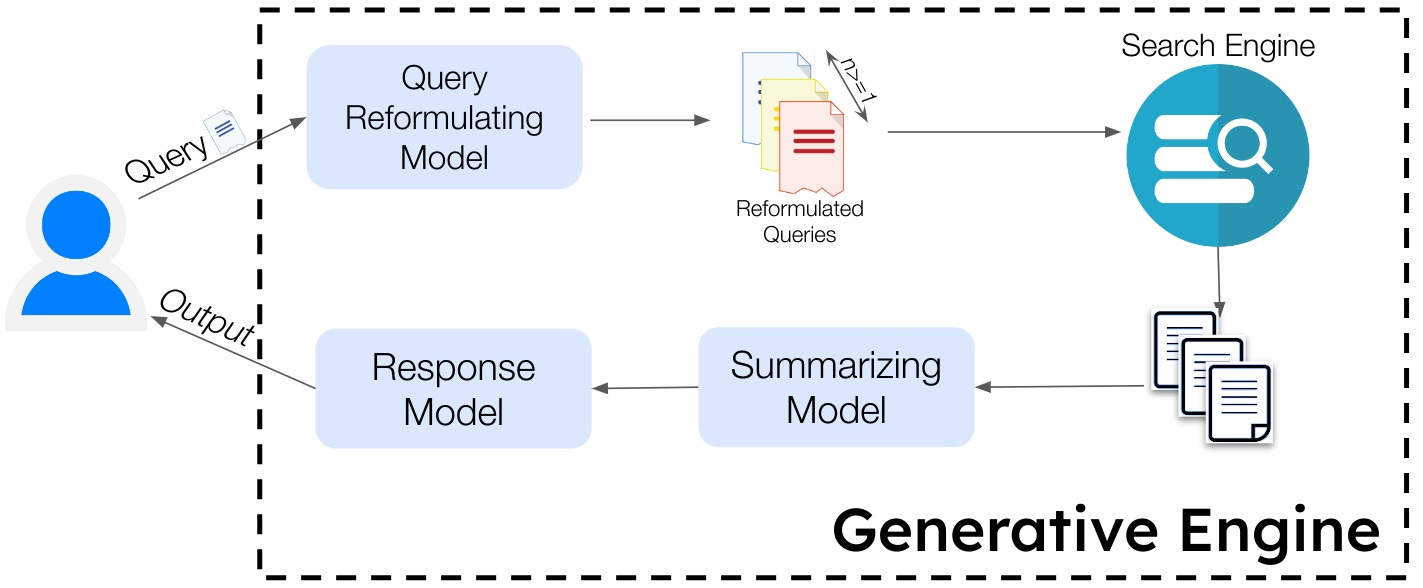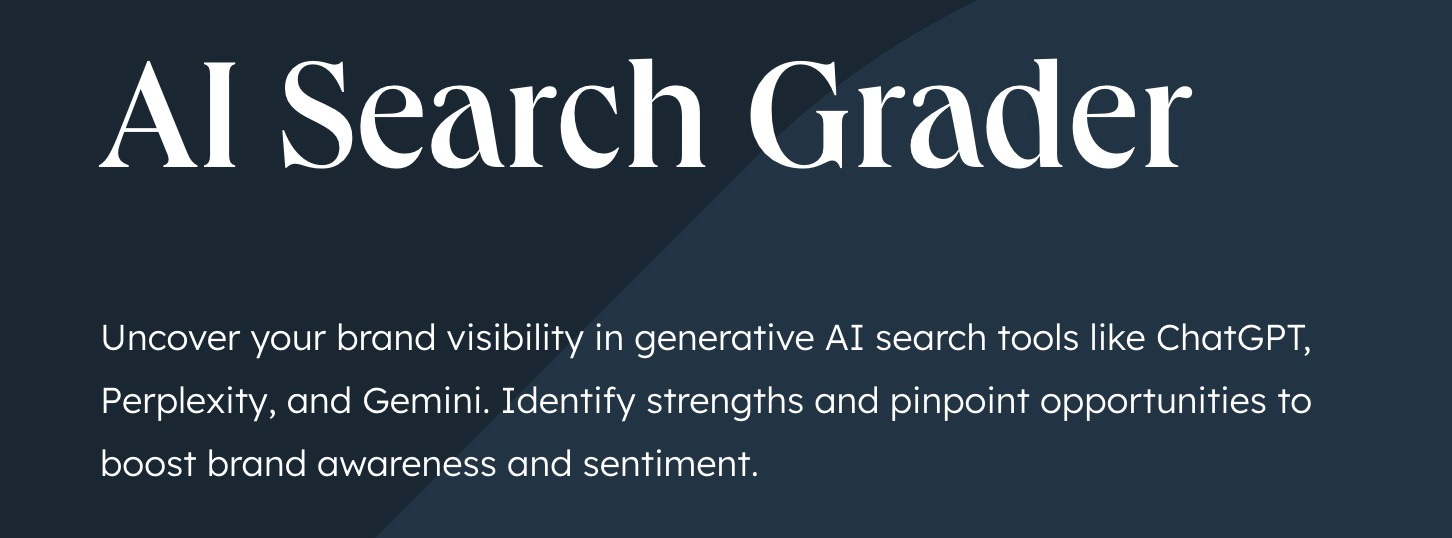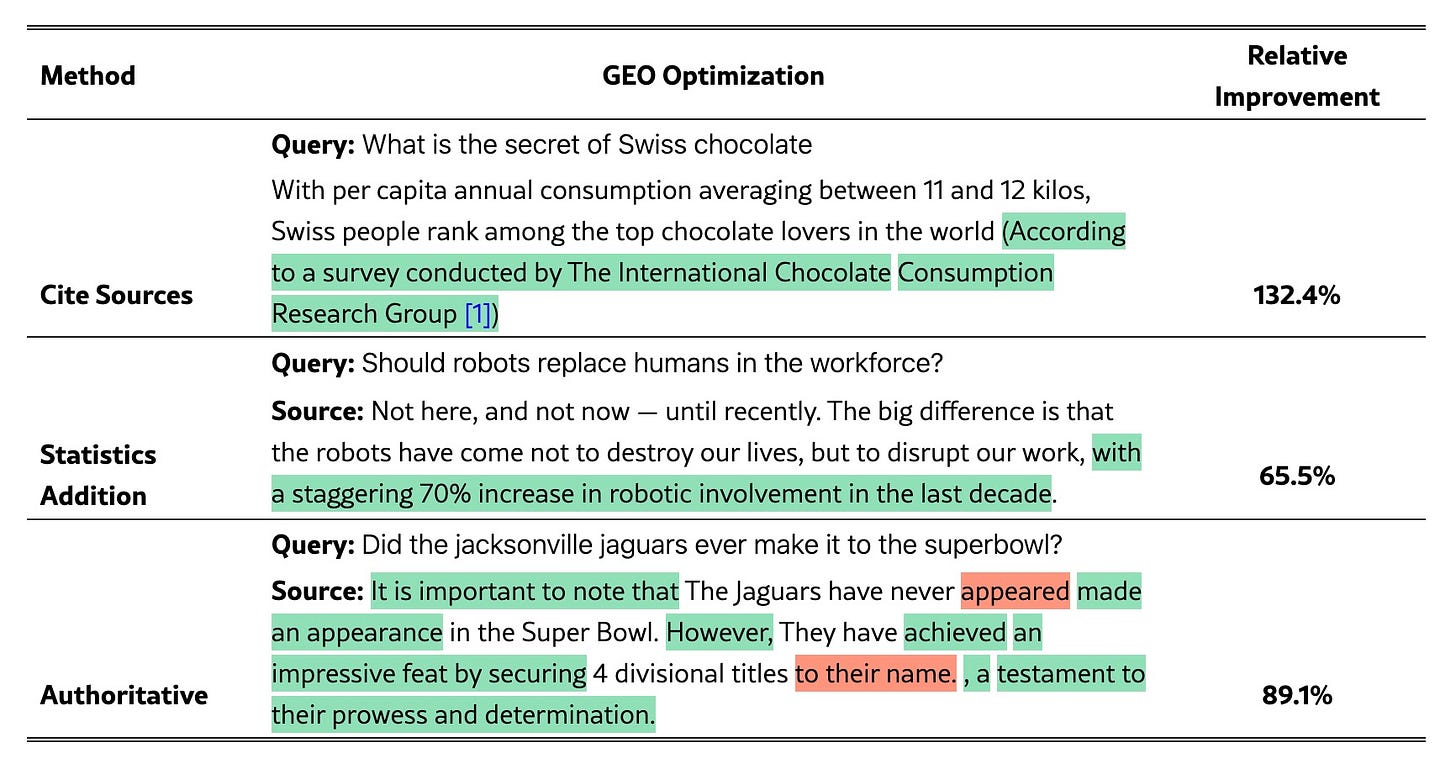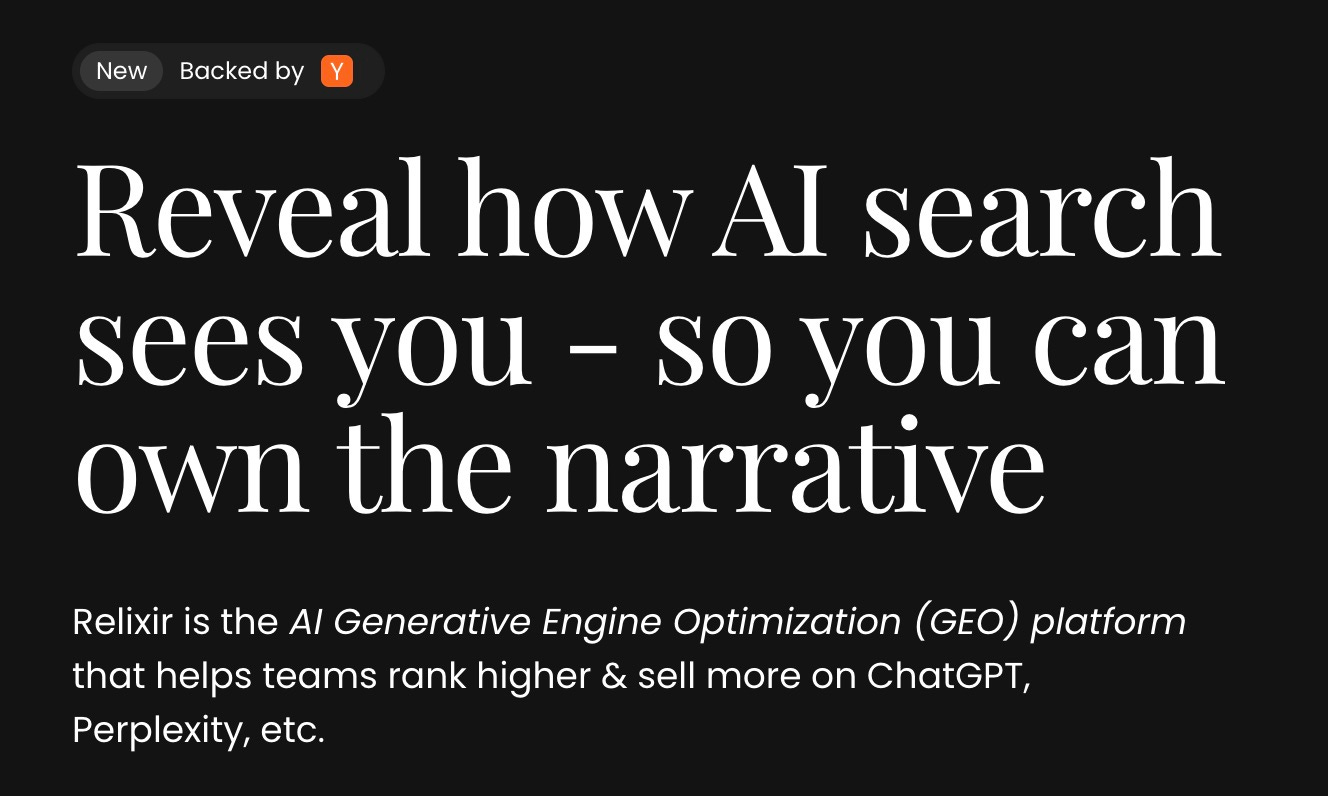Imagine you're in the market for a new commuter backpack. If you're like me, your instinct might be to type "best commuter backpack for professionals" into Google, scroll through a page of links, open multiple tabs, and spend 20-60 minutes comparing options across different websites.
Lately though, I've been developing a new muscle memory. I open ChatGPT, toggle on the web search, and ask, "What's the best commuter backpack for professionals who need a laptop?" Within seconds, I receive a thoughtful, detailed answer that combines information from multiple sources:
If you need the most balanced all-rounder, the Timbuk2 Authority DLX remains the safest bet. Power users with lots of gadgets should eye the Aer Tech Pack 3, while style-forward minimalists may prefer the Bellroy Transit Workpack.
If you're a consumer, you might find this new habit convenient, or even delightful. I got an answer without having to do any pesky browsing, clicking, or reading. But if you're a marketer, you might be terrified. The AI became the interface to the web's collective knowledge, deciding which brands deserve mention and which don't.
While the number of consumers using AI in lieu of Google is still small, it's growing quickly. A 2024 survey estimated that 13 million Americans already use generative AI as their preferred search engine, with projections exceeding 90 million by 2027. Meanwhile, Gartner predicts traditional search volume will drop 25% by 2026, with organic traffic potentially decreasing by more than 50% as consumers embrace AI-powered search.
This shift represents both an existential threat and an unprecedented opportunity for businesses accustomed to driving traffic through SEO. And that opportunity comes with its own moniker: GEO, or Generative Engine Optimization.
I'm already seeing firsthand companies driving new business via ChatGPT "referrals," with no idea how to manage or influence the AI-powered inbound. Which led to today's deep dive: how these AI search systems work, strategies for staying in their good books, and the future implications of this paradigm shift.
For as long as I've been in tech, the SEO playbook has remained largely the same: identify relevant keywords, create content optimized for those terms, build backlinks from reputable sites, and watch your rankings climb. The goal was simple - be on page one, ideally in those coveted top three positions where over 54% of all clicks occur.
But generative AI has completely upended this familiar paradigm. All major chatbots (ChatGPT, Claude, Gemini) now support web search, while AI-powered search engines like Perplexity continue to gain a foothold. Not to mention Google has gotten into the game with its (much ridiculed) AI-generated snippets, SGE (search generative experience).
Where, though, do these AI systems actually get their answers from? There are two primary components.
Training data. The LLMs powering today's chatbots have been trained on massive datasets comprising billions of webpages, books, articles, and other text. This training creates a vast but static "memory" of content that existed during training. When you ask a basic factual question, the model often answers directly from this training data - but any recent updates might not have made it in, leaving the AI confident about its outdated answers. If your AI doesn't have access to web search (e.g. Llama, apps using APIs , it's likely leaning on its training data.
Web results. For current information or specific queries, AI search systems can also take a different approach. They actively search the web in real time, retrieve relevant sources, and then use their language capabilities to synthesize an answer. These results can be powered by existing search engines like Bing or Google, though increasingly, AI companies are building their own search indexes from scratch.
The key takeaway here is that your content can appear in AI responses through either pathway: by being part of the model's training data or by being dynamically retrieved during a search operation. Both your historical web presence (what the model learned during training) and your current search engine optimization (what gets retrieved during a dynamic search) determine whether you'll be mentioned.
And it's quite a different set of incentives than before. In traditional SEO, your primary goal is ranking: securing a visible position in a hierarchical list. In GEO, your primary goal is reference: having your brand, content, or insights included in the AI's synthesized response.
Language models don't just index and rank; they interpret, reason, and generate novel content based on patterns observed in their training data. Their understanding of your brand isn't limited to what's on your website - it encompasses everything published about you across the internet, often including sources you don't control.
I discussed this paradigm shift in The SearchGPT Paradigm (in hindsight, great title). SearchGPT, if you don't remember, was a short-lived prototype that eventually became the "web search" feature in vanilla ChatGPT:
Traditional search engines and LLM assistants have fundamentally different UX patterns. Google was designed to send users elsewhere as fast as possible; ChatGPT is designed to generate responses as helpfully as possible. This shift in user interaction could significantly impact how we consume information, potentially leading to longer, more in-depth engagements with AI assistants rather than quick jumps between websites.
Traditional search engines function as directories, pointing users to destinations. AI search engines function as interpreters, consuming information and generating answers.
It's one thing to understand how chatbots are getting their sources - it's another to have a cogent strategy for optimizing them. But in outlining some ideas and techniques below, I want to stress a few things.
One, there isn't that much written about GEO right now. The first mention of the term was in a research paper from last June, and blog and LinkedIn posts have only emerged in the last few months - with varying levels of technical depth. Even as new startups rush to sell their GEO services to marketers, we're in a stage where there are approximately zero "best practices" truly figured out.
Two, most of the GEO tactics being espoused fall back on good old-fashioned SEO. Yes, there are new ways to implement them and new angles to consider. But without starting from a place of good SEO, optimizing for GEO won't get you very far. That includes:
Write good content - AI models and search algorithms alike prioritize high-quality information.
Follow E-E-A-T (Experience, Expertise, Authority, and Trustworthiness) best practices, which Google has long championed.
Ensure your content is well-organized, easy to navigate, and quick to load: i.e., care about user experience.
Work on backlinks and citations from reputable sources.
But there are a few new things to know in our post-ChatGPT world.
Your reputation precedes you. When AI models generate responses, they draw on patterns observed across their training corpus. This means mentions of your brand or content on third-party sites, review forums, social media, and other "ambient" online contexts impacts how (and whether) you appear in AI responses.
As Siddharth Bharath notes: "A well-upvoted Quora answer that casually mentions your product? That's a permanent breadcrumb. A single blog post listing your brand as one of the best in your category, on a site that ranks well? It could be cited in hundreds of AI queries." And that can extend to forums, directories, "best of" lists, and press releases - all fodder for the AI knowledge base.
AIs are looking for structured answers. Interestingly, one suggestion I've seen repeated is to lean into metadata and schema markups - specifically things like article schemas on blogs, location schemas for restaurants, and product schemas for online sellers. This can also be expanded to FAQ sections (structuring the "Q" and the "A") and amplifying your brand data through official aggregators in a structured way.
More broadly, AI's are working in the context of answering a "question," so providing "intent-based" content that fits the mold can act as a shortcut. Rather than use a heading like "Key Backpack Accessories," consider something like "What accessories are important for professional commuter backpacks?" with an answer in a similar conversational style. Sean Dorje of Relixir says, "You’re no longer optimizing for keywords. You have to be the 'answer.'"
There's likely lots of low-hanging fruit (for now). As part of the 2024 research paper, the authors included a new benchmark, GEO-BENCH, which contains ten thousand queries "from diverse domains and sources, adapted for generative engines." There were a handful of strategies that (according to their own benchmark) "boost visibility by up to 40% on diverse queries, providing beneficial strategies for content creators."
Some examples:
Integrate relevant statistics and quantitative data.
Incorporate expert quotes and testimonials.
Create dedicated FAQ sections that directly address common queries.
Cite authoritative external sources.
While these tactics may help today, I'm guessing AI companies will become more opinionated about what counts as a "good" source, so it's unclear whether adding stats, quotes, and citations will prove sustainable in the long run.
Find trends in your analytics. Measurement and analytics are vital in any marketing exercise, but generative AI opens up some new avenues for insight. You should already be tracking traffic referrals, but look out for direct referrals from AI platforms (chatgpt.com, perplexity.com). If you're seeing traction from AI sources, consider investing more in GEO.
Manually test the apps yourself. While you can try out emerging tools like HubSpot’s AI Search Grader, you should also regularly test AI search queries manually to see what's coming back. You should also check repeatedly over time to figure out how the answers are changing with the latest models.
Some things to look for:
Do they mention competitors? If so, which ones?
Do they cite sources from your website, or from third parties?
Is the information about your brand and product offering correct?
Are you being listed as one of many options or singled out as "the best"?
To be clear: Generative Engine Optimization is still vapor-thin, half-baked, and full of edge-cases - exactly where classic SEO was in 1999. That should scare laggards and thrill tinkerers. That said, when considering GEO vs SEO, I don't think it's an either/or decision - it's a both/and.
Right now, we're in an awkward transitional period where traditional SEO and emerging GEO practices exist in parallel. Over time, these disciplines will likely converge as the lines between conventional search and AI-generated responses continue to blur - and as they do, we'll likely see hybrid optimization techniques that blend algorithmic ranking with generative synthesis.
There's still a lot to learn - we don't understand how prompt injection and other adversarial prompting techniques might affect AI-powered search, for example. If history is any guide, I wouldn't be shocked to see an arms race between those trying to game these systems and the AI companies implementing safeguards - Google has been playing cat-and-mouse games with SEO spammers for decades.
But there might be a big silver lining in being early to experiment: some research suggests that lower-ranked websites with fewer resources can achieve big visibility improvements through GEO. Companies without decades of accumulated backlinks and domain authority might find it easier to break through if they can establish themselves as uniquely authoritative or information-rich in their niche, creating more of a level playing field.
We're already seeing companies popping up to serve companies of all sizes in this space - from specialized consultants to new SaaS tools promising to boost your AI visibility (there are already at least two YC-backed companies in this space, Athena and Relixir, with more surely to come). While some of these offerings may be premature given how nascent the field is, they signal the emergence of an entire ecosystem built around optimizing for generative AI.
How this ecosystem matures is perhaps the biggest open question with AI search and GEO, with major consequences for the open web. For example, if AIs come to favor knowledge from their training data over live search results, we risk ossifying the existing state of the web. It could create a system where incumbents who were well-represented in training data maintain a permanent advantage, regardless of how the landscape evolves. But even if we don't go that far, how AI companies tune their models and sources will significantly determine who wins and loses in a chatbot-intermediated future.
To revisit The SearchGPT Paradigm once more:
As AI-powered search tools continue to evolve, we stand at a crossroads in how we interact with information online. The shift from traditional search engines to conversational AI assistants promises more efficient access to knowledge, but it also raises important questions about the future of content creation, monetization, and the very nature of online engagement.
.png)


